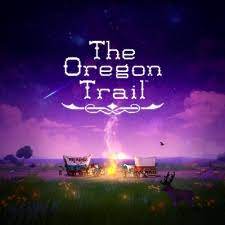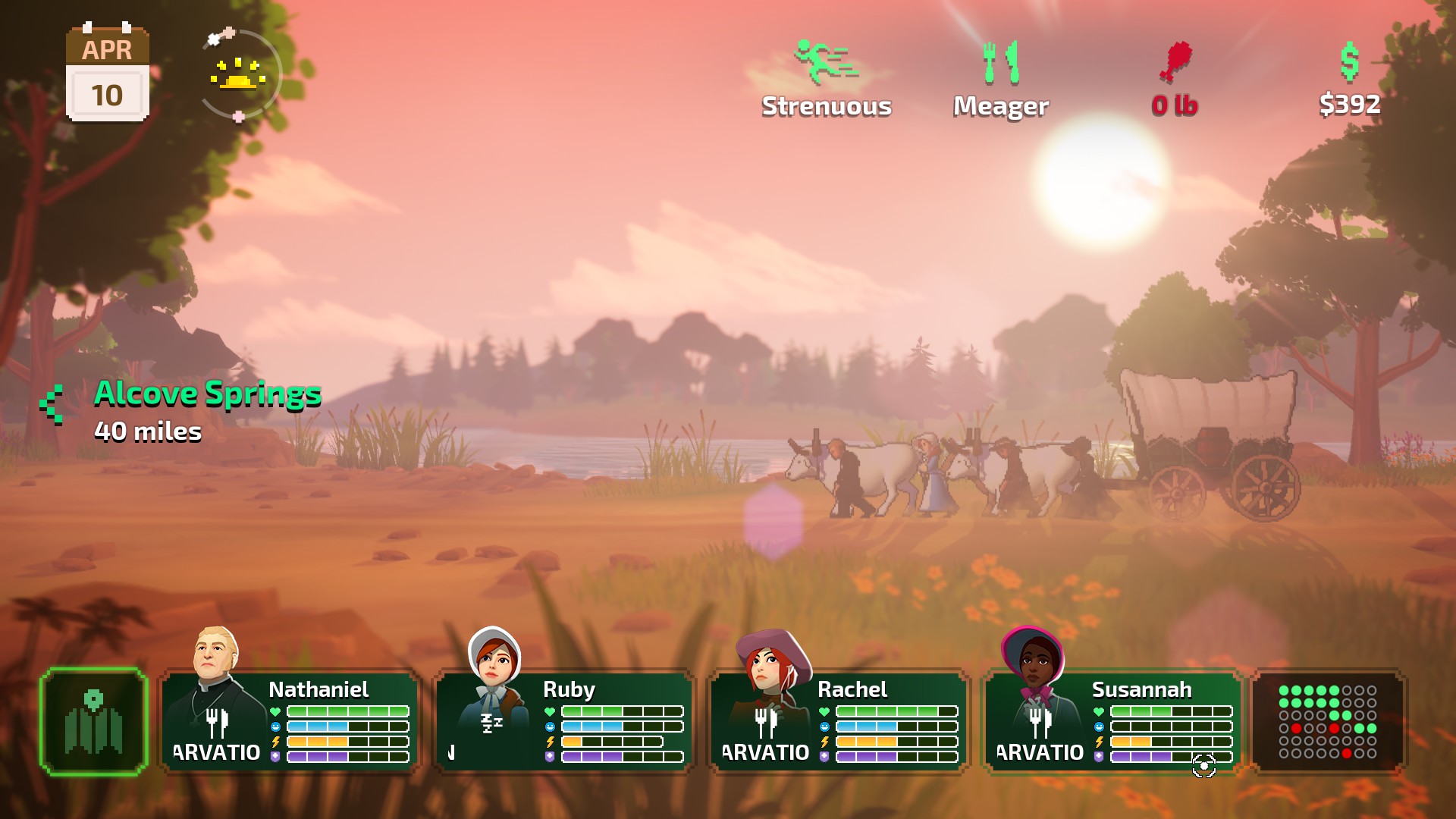Search
[{{{type}}}] {{{reason}}}
{{/data.error.root_cause}}{{{_source.title}}} {{#_source.showPrice}} {{{_source.displayPrice}}} {{/_source.showPrice}}
{{#_source.showLink}} {{/_source.showLink}} {{#_source.showDate}}{{{_source.displayDate}}}
{{/_source.showDate}}{{{_source.description}}}
{{#_source.additionalInfo}}{{#_source.additionalFields}} {{#title}} {{{label}}}: {{{title}}} {{/title}} {{/_source.additionalFields}}
{{/_source.additionalInfo}}- Details
- Category: Computer
- By J. Todd Cumming
- Hits: 2828
The Oregon Trail (PC)

The Oregon Trail
Developed by: Gameloft
Published by: Gameloft
Released: November 14, 2022
Available On: Windows 10, iOS, Nintendo Switch
Genre: Adventure
ESRB Rating: Teen (cartoon violence, use of drugs, drug reference, alcohol reference)
Number of players: One
Price: $29.99
Thank you, Gameloft, for providing us a copy of this game to review!
The Oregon Trail was a large factor of the Westward expansion of the United States. Although it technically started in 1811 with fur traders and trappers, it became much more prominent in the 1830s and '40s, with the most use seen between 1846 and 1869.
Along with that pioneering spirit, the original "Oregon Trail" video game was released in 1971 as a text-based game. It was adapted for the Apple IIe in 1978, and quickly became a staple in schools across the country. Now, in 2022, the newest iteration has hit Steam. People have been playing the Oregon Trail video game (51 years) for nearly as long as people had traveled the Oregon Trail in real life (58 years)!
But how does the current game stand up to the old ones? For the purposes of this review, I've decided to bring in my wife, Elsa, as a consultant. She has been a long-time fan of the franchise, and remembers playing the 1983 version back in school. She also is an ardent history buff and a real stickler for historical accuracy. When I mentioned that I was given the opportunity to try out the game, she was excited at the chance to give it a try herself!
Elsa: Boy, was I disappointed.
Todd: Now, let's not get too hasty, dear. We should sum up what the game is about first.
The game starts in 1848 or 1849, depending on the route you take. You gather together a party of four people in Independence, Missouri, and decide what your ultimate destination is going to be. You outfit your wagon and decide what to purchase, including food, ammunition, clothing, spare parts for your wagon, and that sort of thing.

Strong Points: Entertaining minigames, lots of replay value, cute graphics
Weak Points: Lack of historical elements and accuracy, no voice acting, poor controls
Moral Warnings: Mild violence, characters get sick, some death, players can rob people
Elsa: Right away, I was disappointed with the selection of the characters. Instead of being allowed to create your characters from scratch, you have to choose four party members that are randomly generated by the computer. In my opinion, part of the fun of the earlier games was creating a story for your pioneer family. What if I wanted to have a mother traveling with her four children, trying to escape an abusive husband? Or if I wanted a lone prospector making his way to California? Or a newlywed farmer and his wife looking for new ground on the coast? These options were taken away with this version of the game. Quite often, I was faced with having to choose one person out of three options, and none of them looked appealing.
Each character has a profession – which can provide different in-game benefits – and two personality traits. However, you aren't made aware of the skills or personality strengths of these characters upon selection. You have to reveal them through the various encounters and events as you go along the trail. The random nature of the game makes it difficult to determine who can fit in which niche. What happens if I get stuck with a broken wagon, but none of my characters have any carpentry skills? I won't know that until the wagon actually breaks.
I mentioned the personality quirks earlier, and because they are randomized it leads to some rather bizarre outcomes. For example, I could choose a missionary that also was a compulsive liar. Or how about a farmer with the "lazy" trait? It just didn't make any sense at times.
Todd: On the plus side, the graphics are nice and colorful, if a bit eccentric. For a good portion of the game, your party travels along a rough road in a 16-bit style. When you get to a large settlement, though, it presents a 3D animated cut scene. When you go into a store, the figures become still cartoons. It takes a bit of getting used to, but the bizarre mishmash of the different styles makes it almost feel like there were too many designers and not enough art directors to make the final decisions.
The music, on the other hand, is pretty sharp. I really enjoyed the tunes. There is no voice acting, however, and the sound effects are fairly simplistic.
The controls are awkward, to say the least. This was an adaptation of an iOS game that Gameloft released in 2009. Some of the controls seem like they didn't make the translation well. The mouse frequently responds as if it were a double-click, or didn't click at all. Using a game controller is actually worse. For most games the "A" button is used to confirm choices, but in Oregon Trail, the A button actually cancels your action. To select, you need to press the "B" button. It does take some getting used to, if you even want to. The fishing minigame actually works much better with the mouse and keyboard than the game controller, as does the minigame whenever you need to repack your wagon - which occurs frequently. Even though the game is controller compatible, I certainly don't recommend using it for Oregon Trail.

Higher is better
(10/10 is perfect)
Game Score - 62%
Gameplay – 10/20
Graphics – 6/10
Sound – 6/10
Stability – 5/5
Controls – 4/5
Morality Score - 83%
Violence – 7.5/10
Language – 7/10
Sexual Content – 10/10
Occult/Supernatural – 10/10
Cultural/Moral/Ethical – 7/10
Elsa: Since you mentioned the minigames, I'd like to add that that seems to be the main emphasis of the game itself. There is a hunting minigame (which I found a bit confusing, to be honest), there is the rafting minigame, the fishing minigame.... Overall, it seemed to me like there is more emphasis on the games, and not as much on immersing the player in the historical elements of the game.
For example, one of the things I really enjoyed in the previous versions of Oregon Trail was some of the natural medicines that the pioneers had to use. If a person came down with an illness – such as dysentery – you had the option of choosing what kind of remedy to use. Some would be a bad choice, and could actually make the situation worse. In this game, you only have two choices: store-bought medicine, or natural herbs that your characters can find along the trail. And, of course, both work to cleanse any condition, whether it's a stomach ache or a broken leg. The game has been dumbed down, which takes some of the fun out of it in the process.
Todd: Each trek along the trails takes several hours to complete. Even at the "sightseer" difficulty my first playthrough took 5 1/2 hours. Completing the game unlocks more aspects, such as new trails, different professions and even items you can purchase at the store (such as a grandfather clock). Yet some of the way items are used are odd, to say the least. For example, the harmonica is a single-use item that helps to boost morale. Like Elsa said, this version tends to take more of a "gamer" approach, rather than historical realism.
On the plus side, there is some historical relevancy to the game. The locations and many of the names of people did exist at that time. Some of the dialogue when talking to people seem to have been lifted from their own journals. But this seems more like simple icing on the cake rather than a part of the core experience.
There is an on-line community component, where two different teams compete to build the railroad lines. You don't see the names of other people in this event, but the names of some people do appear in the "high score" section at the top of the main menu. I'm not sure if there would ever be any offensive names appearing in this section, but I can see that being a possibility.
In terms of other aspects that might raise moral questions, the only real violence would be in the hunting minigames, where your character can shoot animals for meat. Your characters can get sick (and do often) and sometimes can be seen throwing up or having diarrhea (the latter with a censor bar, fortunately). The word "d**n" is mentioned a few times, but such occurrences are extremely seldom, and I didn't spot any other offensive language during my playthrough. Death is a pretty common occurrence along the trail, so it is common to come across tombstones and graves. Fortunately, when your own characters die, it's treated through dialogue boxes, and nothing graphic is seen.
Along the trail, you will often come across stranded travelers, or opportunistic salespeople. One of the more questionable things that players can do is actually rob some of these travelers. The only repercussion from these actions seems to be a slight hit to the morale (and I would imagine that can change based on the character's personality traits). The fact that my party could do this – even though they were being led by a missionary – seems equally alarming. Even though you can have religious characters, they don't use their religion as an obstacle to commit underhanded behavior.
All in all, Oregon Trail can be an entertaining adventure game to play. It does have a feel of a lot of modern games, with a lot of aspects of the game that can be unlocked to further enhance the experience.
Elsa: But in the process, the main focus of the Oregon Trail games – which gives the players an opportunity to immerse themselves in the lives of the pioneers – is lost. I felt that this version of the Oregon Trail was a waste of my time. Which is really too bad – I was hoping for a chance to re-experience my love of the earlier games. But by dumbing down the content, taking away a lot of the choices and emphasizing more minigames, they also have taken away some of the most entertaining elements of the earlier games.
Todd: So there you have it. A look at the Oregon Trail from two different perspectives. Do you want to see if you have what it takes to survive a 2,000-mile trek with a covered wagon? Or would you rather find other ways to relive history?








